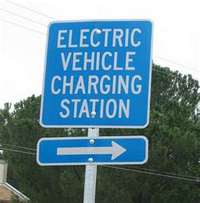Long-term Cost Savings and Infrastructure Essential to Electric Vehicle Growth
 |
Global Hybrid and Electric Vehicle Market Share Projected to Reach 6.3 Percent by 2020, PwC's Autofacts Forecasts
DETROIT--March 6, 2013: Charging stations and battery swap locations are the most crucial to developing a sustainable electric vehicle (EV) infrastructure, according to more than 40 percent of respondents to PwC's Electric Vehicle Survey 2012. Global hybrid and EV market share is forecast to reach 6.3 percent by 2020, according to PwC's Autofacts. As municipalities continue to work with the private sector to meet future demands and develop Smart Cities, finding the ideal ratio between integrated public charging stations and the number of EVs on the road is a prevailing challenge when investing in existing and future infrastructure.
" Continued investment to improve upon the electric vehicle value chain, along with the pace of advancement in competing alternative fuel solutions will ultimately determine the level of success EVs are able to achieve," said Brandon Mason, senior analyst, PwC's Autofacts. "While we don't expect one to be parked in every driveway anytime soon, there is no doubt that EVs are here to stay."
Approximately 25 percent of survey respondents said one public station for every 20 EVs is an ideal ratio, while 20 percent indicated one station for every five vehicles is ideal. Roughly 80 percent of respondents also indicated that 30 minutes or less charge time is considered fast charging for EVs.
Focusing on price, nearly 46 percent of respondents felt that long-term total cost of ownership savings is the most likely reason consumers would be willing to pay an upfront premium for an EV. Automakers continue to evaluate the price premium consumers are willing to pay for an EV. Survey respondents indicated that consumers willing to pay a premium price would need to remain under $5,000 (PHEVs 57.9 percent, PEVs 47.7 percent).
"Automakers accelerate their efforts to find solutions to reduce costs for battery, alternative drive train and the vehicle overall," said Oliver Hazimeh, automotive cleantech transportation leader, PwC. "Passing high initial development costs on to the consumer is not a long-term option as it is not viable to rely on long-term government incentives. Auto companies need to deploy smart vehicle and technology platforms and global partnerships to achieve economies of scale."
Survey respondents indicated global collaboration (26.6 percent) will lead the development and production of EVs and supporting technologies by 2020. Respondents said China will lead by 2020 (25.9 percent). Automakers are working to find a balance between production and consumer demands. The trend is to build where you sell. Automakers planning for long-term success will likely have the competitive edge.
To view the full Electric Vehicle Survey 2012, visit Survey .
About the Survey
Charging forward: Electric Vehicle Survey 2012
was developed to provide a check-up on some of the major determining
factors for the success of EVs. More than 200 participants from 34
countries representing the automotive, utilities, energy, technology,
government, finance, and education sectors provided their feedback. The
survey focuses on four key areas: infrastructure, pricing, geography, and
outlook and includes selected results along with additional thoughts from
PwC on the present and future outlook of EVs.
About PwC's Automotive Practice
PwC's global automotive practice leverages its extensive experience
in the industry to help companies solve complex business challenges with
efficiency and quality. PwC collaborates closely across the EV/clean
transportation value chain to provide strategic and operational business
model innovation. PwC is considered a thought leader and is
frequently invited to speak on the topic of alternative propulsion
technology. Our in-field experience is further supported by
one of PwC's global automotive practice's key analytical capabilities
through its Autofacts
group, a team of automotive industry specialists dedicated to ongoing
analysis of sector trends.
About Autofacts
Autofacts, PwC's automotive forecasting service, is a provider of
automotive market analysis, strategy development, and competitive
intelligence to the world's leading vehicle manufacturers, automotive
suppliers, and support organizations.
Autofacts provides our team of more than 4,800 automotive
professionals and our clients with data and analysis to assess
implications, make recommendations, and support decisions to compete in the
global marketplace.
Autofacts service offerings are available on-demand, for
one-time purchase and through an annual subscription basis to access
the online portal with Autofacts' proprietary data query tool.
.


